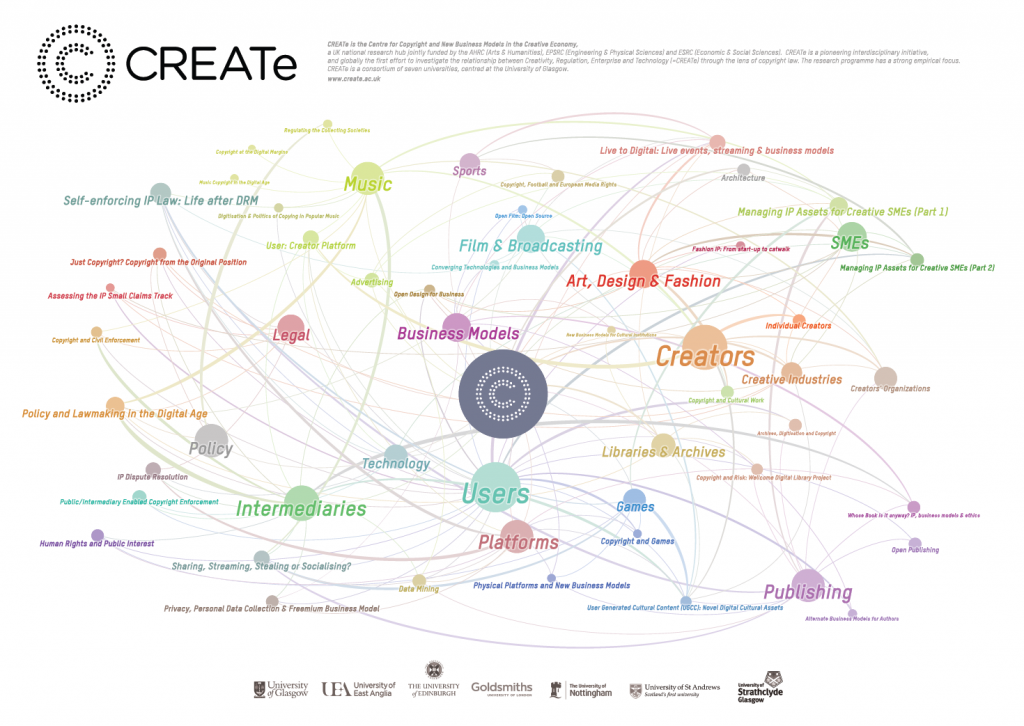Reflections on CREATe’s first year by Professor Martin Kretschmer, Director of CREATe
Contested Policy Environment
It is now one year on since CREATe was launched to high expectations in the Hunterian at the University of Glasgow. The digital revolution has moved copyright law to the regulatory centre of the creative industries. For investors, copyright has developed into a currency; users struggle with rights clearance (or ignore rights altogether); creators seek ever new ways to the market. It is a world of believers and non-believers. We hear wildly conflicting claims about the value of intangible assets, about the benefits of open and closed models of innovation to firms and society, about the potential of massive collaborative projects (wikinomics), about the impediments that existing copyright arrangements pose for new derivative markets (mass digitisation, translation services, social media), and about the link between unauthorised consumer activities and lost sales.
It is a particular challenge to establish a research centre in such a contested environment. The more urgent an independent approach becomes, the harder it is to achieve. Where myths and anecdotes rule, may transparency help? At CREATe, we are taking great care to expose our methodological approach and research designs to early scrutiny by academics, as well as industry and policy users of research. We document our major events scrupulously (we have welcomed close to 1,000 delegates to 20 events during our first year); we disseminate our research as working papers (15 as of March 2014); we have contributed to 9 consultations and policy interventions; we run digital resources on our website (28,500 unique visitors from 161 countries).
First Results
I would like to introduce four examples where CREATe’s research is beginning to change knowledge and behaviour in the creative and cultural economy.
Orphans and Archives: Archives as memory institutions are a significant source for learning and innovation, as well as of cultural value in their own right. In the UK alone, there are “up to 2,500 museums, 3,393 public libraries, 3,000 community archives, 979 academic libraries and approximately 3,500 trust archives” (IPO 2012). Many of the materials in these institutions are so-called “orphans”, i.e. works in which copyright still subsists, but where the rightsholder, whether it be the creator of the work or successor in title, cannot be located.
CREATe has contributed to a report for the UK government assessing licensing and price options for the use of orphan works. CREATe also has scoped the Wellcome Digital Library’s Codebreakers Project from a copyright and risk viewpoint to assess the merits of the risk-managed approach to copyright clearance. This project is producing a digital resource that will include a risk management toolkit for cultural and archival institutions:
https://www.create.ac.uk/archivesandcopyright/
File-Sharing Evidence: On 11 April 2014, at Stationers’ Hall (the 17th century livery hall in the City of London that has a claim to being the birthplace of the modern copyright system) CREATe is launching a behavioural economics analysis of all available empirical studies on file-sharing and unauthorized use. What is the evidence i) on the welfare implications of unlawful sharing of copyrighted media online; ii) on the proposed causes of unlawful file sharing? Propositions are visualised in a cubic space where the number of sources of evidence identified for each proposed determinant of unlawful file sharing are split according to evidence type and specific media. It demonstrates that our current knowledge of file sharing is dramatically skewed by method and sector.
https://www.create.ac.uk/blog/2014/01/14/file-sharing-review/
Digital Assets On Death: A recently published paper by CREATe has explored major legal issues pertaining to transmission upon death of digital assets such as Facebook or Google+ profiles; emails, tweets, databases; in-game virtual assets from Second Life, World of Warcraft), digitised text, image, music or sound, such as video, film and e-book files; passwords to various accounts associated with provisions of digital goods and services, either as buyer, user or trader (e.g. to eBay, Amazon, Facebook, YouTube etc); domain names; 2D or 3D personality-related images or icons such as user icons on LiveJournal or avatars in Second Life.
https://www.create.ac.uk/publications/
Copyright User: This is a multimedia resource aimed at helping creators, media professionals and the general public understand how to protect their work, how to license and exploit it, and how to legally re-use the work of others. A joint collaboration between CREATe and Bournemouth University, Copyright User builds up a picture of copyright reality from the most frequently asked questions (FAQs) online, and offers videos, interactive tools, and authoritative short essays. The resources are meant for everyone who uses copyright: musicians, filmmakers, performers, writers, visual artists or interactive developers. Copyright User is launched at the AHRC Creative Economy showcase on 12 March 2014.
http://copyrightuser.org/
Future: Open Knowledge Environment
It is a long term aim of CREATe to advance peer production of knowledge resources for the creative industries, creators and citizens. Digital technology allows new partnerships, and the integration of data from multiple sources: academe, government and industry. Digital technology facilitates a fundamental iterative process, linking knowledge creation, testing, dissemination and use. Universities have an opportunity and obligation to lead here.
If you wish to become involved with CREATe, I would encourage you to sign up to our information service “Subscribe to CREATe”, on the right side of the home page.

